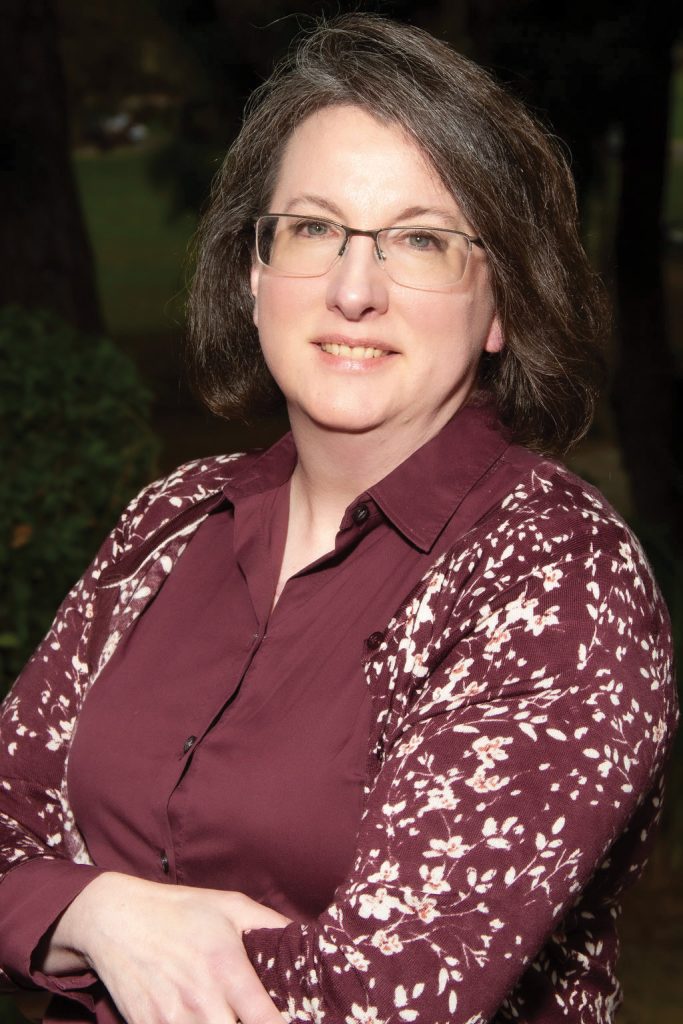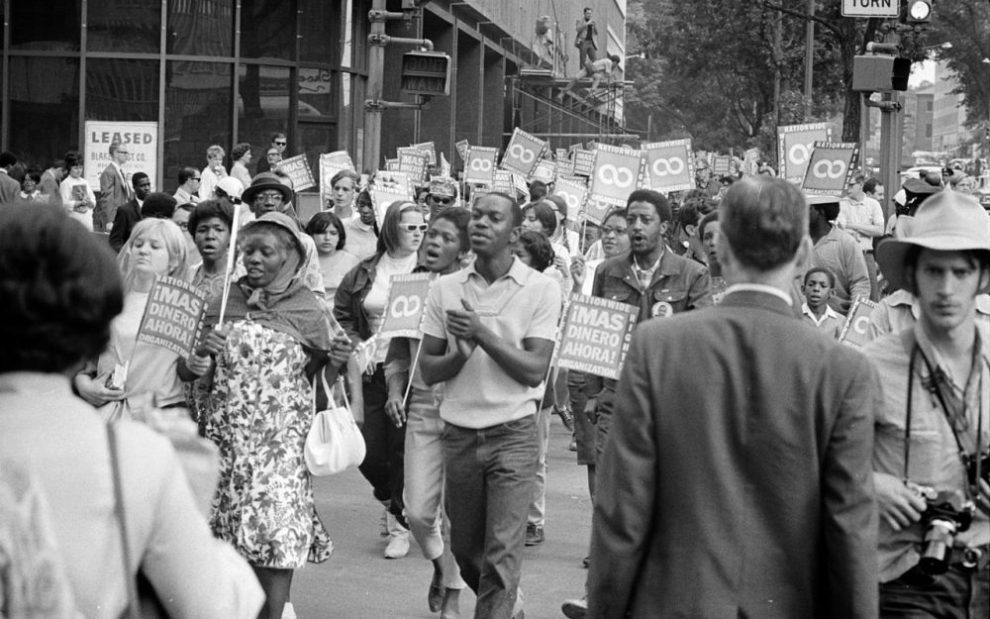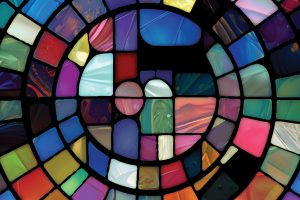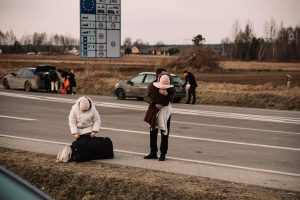
“Religion, especially Christianity, has been so predominantly intertwined in the United States with a conservative religious and political agenda,” says Rosemary Carbine, a professor of religious studies at Whittier College. “Therefore, Catholic public engagement is often limited to the voices of dominant institutional church spokespersons and their statements about these issues. But there are a host of other moral and social actors in U.S. public life who are reenvisioning the role of religion in U.S. politics and trying to promote a more multi-faith, multicultural democracy.”
Carbine’s new book, Nevertheless, We Persist (Orbis) highlights these movements, grounding their work in a new vision of public theology. Informed by feminist, womanist, and mujerista theologians, the book envisions a new way of interpreting Christian engagement in the public sphere—one that builds the kingdom of God instead of fostering division and conflict. Carbine points out the fatal flaws in how we tend to envision both the role of religion in public life and public discourse itself and paints a picture of a new way of political engagement grounded in Catholic social teaching and such diverse social movements as the Catholic Worker, the civil rights movement, and United Farm Workers.
Carbine’s resulting theology is one that prizes solidarity over consensus, prophetic truth-telling over rational discourse. It challenges our typical understandings of how religion and politics should engage each other to argue for a new way of being church together in the public sphere, a way that includes people of all faiths and no faith at all.
How is U.S. public life typically structured or understood?
U.S. politics is structured to “other” people in various ways. For example, many theologians portray U.S. public life as requiring a certain kind of logical rhetoric and reasoned methods of communication. Political deliberation and decision-making should lead to consensus. There’s this rational ordering to the U.S. public sphere in which we engage in reasoned debate to seek consensus about public policies that shape and sustain the common good.
However, U.S. public life fails to realize that these communicative practices are not equally open to all people in U.S. civil society. This definition of public life insufficiently criticizes the way that democracy can perpetuate exclusion. This understanding of political discourse is related to very essentialized definitions of what it means to be human and a political actor. And these definitions are tied to a lot of privilege.
Thus, social movements throughout U.S. history have expanded the U.S. Constitution and broadened who we mean by “we the people.” Oftentimes deliberative democracy excludes marginalized folks who don’t fit within privileged notions of race, gender, class, and other ideological constructions of who counts as a political actor in this country. Social justice movements intervene and disrupt these idealized notions of democracy to create more solidarity rather than othering people.
Can our political system as structured ever truly lead to justice?
I don’t want to entirely jettison the notion that we need to talk to one another, but I do think we need renewed ways of communicating beyond this rational ordering of the public sphere. We can rethink U.S. democracy through alternative modes of communication beyond what we currently use in U.S. public life. My book, Nevertheless We Persist, interprets the work of social movements throughout recent U.S. history to examine how their practices change the discourse and go beyond consensus to build community.
How is the view of public life you promote different?
Drawing on the work of feminist biblical scholar Elisabeth Schüssler Fiorenza, along with other feminist, womanist, and mujerista theologians, I propose a vision of public engagement as an innovative theological framework that highlights different practices in U.S. public life that build communities in ways that address multiple social justice issues.
Our contemporary politics is fractured and impoverished by racism, sexism, class privilege, anti-LGBTQ policies, and rising anti-democratic movements. Poverty, racism, anti-immigration, militarism, and ecocide are fragmenting our world. The framework I suggest in my book doesn’t minimize these conflicts, but confronts them. The social justice movements I highlight are all building a future that is more participatory, egalitarian, and just. All these movements are seeking this vision of the future while also bringing it into reality through practices that create diverse community.
My book breaks new ground in that I open up the possibility of redefining public theology beyond the rhetorical to include a whole range of other practices. For example, when we talk about the relationship between religion and politics, people focus on how to introduce religious claims into the secular public sphere. My approach focuses less on this issue and more on how our religious and political participation reimagines and reshapes our all-too-often conflict-ridden and exclusionary society. How does religiopolitical engagement call into being a more just vision of public life? I do this by showing how U.S. social movements reclaim the public’s voice, rethink religious claims, and reimagine religious symbols. By doing so they reinvigorate U.S. democratic life, reengage in prophetic practices that disrupt the current fractured nature of public life, and break open a space for something more just to take root.
Can you give an example of how faith-based social movements can change how we think of public life?
During the civil rights movement, people such as Martin Luther King Jr. and Ella Baker utilized a whole range of practices that at first seem more appropriate to religious communities than to public activism. Things like their rhetorical practices—speeches and letters, of course, but also sermons and addresses at mass meetings in churches along with prayer, ritual, and song. They developed new symbols that resulted in totally new theological views of God and Christ and a theology of suffering for justice that takes place in solidarity with others. The notion of the beloved community is religiously rooted, and yet today it has been picked up and highlighted by multiple social justice movements across the United States.
Practices of prophetic protest aimed to build what King called alliance politics or solidarity against the triple evils of racism, poverty, and militarism. Both King and Baker appealed to basic democratic and humanist principles of human dignity to build public solidarity through nonviolent direct action: sit-ins, sit-downs, marches, rallies, and other mass mobilization campaigns. They both tried to fully realize the religious notion of a beloved community within a more just and radical understanding of U.S. democracy.
In 2018, the Poor People’s Campaign restarted on the 50th anniversary of the original campaign, which began right after King was assassinated. It also builds on this notion of alliance politics, what William Barber II and Liz Theoharis call moral fusion coalition building. Their work interweaves all these rhetorical, symbolic, and prophetic practices: It encompasses sermons and speeches, but also includes local and national listening sessions, assemblies, and congressional hearings in order to empower the majority of folks in our country who are economically marginalized to be the body of Christ and to renew the U.S. body politic. All their work is channeled to criticize the dominant national narrative and reenergize more liberative possibilities that rehumanize U.S. public life.
What do these practices say about who God is or what we are called to be?
All theology addresses specific publics, whether the church or society. But public theology specifically examines the interrelationships between religion and politics, church and world. It also examines the roles of religion in public life.
In Nevertheless, We Persist, I weave together public theology, feminist and womanist theology, and significant U.S. social justice movements to gain insight into how we effect sociopolitical transformation. Is there a more just way of redefining public life? What practices help realize that vision?
When we look at specific Christian social movements, we see that their practices offer ways of cocreating a just world with God. There’s an implicit understanding of God embedded in their actions. In other words, the practices of faith-based social justice movements evoke new ways of understanding our common life and cocreating with God a more just world. They birth the new world that creation is groaning to bring about and remake the world in more just and humane ways.
These practices include personal and communal storytelling, sermons, speeches, biographies, testimonies, protest placards, prophetic collective action, and more. They create a narrative of a more coalitional politics and rethink symbols that reshape both our religious communities and public life.
For example, Dorothy Day approached social change and social justice by focusing the Catholic Worker around the rhetorical work of journalism and autobiography but also by introducing new theological symbols. Through prophetic action such as nonviolent antiwar protests, she changed the understanding of Christology and the imago Dei by stressing that all of life cocreates itself in relationship. She embraced a more personalized and politicized understanding of love rooted in this radicalized practice of the works of mercy.
All of these practices aimed to criticize the confluence of poverty, militarism, and racism and formed the basis of the Catholic Worker Movement. And today more contemporary movements, such as Valarie Kaur’s Revolutionary Love Project, radicalize and amplify the Catholic Worker’s message into a broader ethic for justice. Kaur is a Sikh civil rights activist who created this multifaith, multicultural movement that stresses love as seeing no one as strangers, which correlates with Christian ideas from Matthew 25, for example. She models tending to personal and sociopolitical wounds and breathing and pushing together to birth a more just world.
Again, while Kaur operates from a Sikh, religiously pluralistic perspective, she brings a different sort of religious basis to this radical kind of love for justice that carries forward some of the ideas from the Catholic Worker in a 21st-century way. God in these movements cocreates with public actors to birth a more just world. And, in a way, these practices themselves are responding to an ongoing divine presence in the world that lures us toward a more just future.
What is the place of Christian public theology in a multireligious world?
Religions have inspired and motivated many social justice movements in the United States. Among the case studies in my book, some aim to foster interfaith coalition and bring together folks who don’t necessarily share the same religious foundation but do share the same goal. People engaged in these social movements don’t necessarily have to agree, but they should understand the religious motivations behind these movements and how faith shapes their rhetorical, symbolic, and prophetic practices of social change.
One wonderful example is the United Farm Workers’ pilgrimage from Delano to Sacramento in California. They arrived in Sacramento on Easter weekend, calling to mind all these metaphors of resurrection and the rebirth of a marginalized community. And yet when Dolores Huerta spoke from the steps of the state capitol building, she was not speaking only to a Christian audience nor only to an interfaith audience; she was instead speaking to everyone involved in the coalitional politics that developed out of solidarity with farmworkers through that walk. Whether you interpret that walk as a pilgrimage under the sign of Guadalupe, a multifaith public action, or protest march, it galvanized and mobilized solidarity across religious and non-religious lines.
What would public life look like in our country if this became the norm for political engagement?
This is a wonderful question that gets to the heart of what public engagement should do: create community, engage in the community, and utilize a broad scope of different practices to imagine a more just community.
My book ends with a case study of Nuns on the Bus, tours led by Sister Simone Campbell and a coalition of religious sisters within NETWORK that highlight different issues that degrade or dehumanize U.S. public life. Will this or any of the other social justice movements I highlight resolve all the issues that fracture our society in our time? No. But they are edging us toward more just policy, more political engagement, more everyday folks out in the street engaging with these issues. They encourage more folks to take their place, take up space, and articulate their voice within a U.S. public sphere that may or may not currently welcome them. Those voices disrupt what currently marginalizes people and open up alternative possibilities.
If this kind of mindset led our engagement in public life, most of us would be engaged in social movements. Most of us would try to make connections between what we know and how we live. Right now, our public policies continue to dehumanize folks, whether we’re eroding voting rights, denying health care, or challenging the vitality of the social services safety net. In an ideal world, we’d look at our religious claims and symbols about, for example, all creation being equal in the eyes of God and make public policy that respects those ideals.
Do you think we’ll get there?
I started this book when 9/11 happened, and I completed this book during COVID-19, the rise of white nationalism, and the racial justice reckoning that took place throughout the United States. Those events, to me, thoroughly demonstrated the fragility of U.S. democracy in many ways. This book offers a realistically hopeful view of what it would mean to do community-creating work when democracy is constantly demonstrated to be fragile and needs to be continually recreated by each generation.
Doing this type of work, people have to perennially ask themselves: “What do we need to counter and reenvision about our oppressive sociopolitical order?” The intersectional approach to analyzing injustice demonstrates that we can’t address these issues in isolation, and none of the social justice movements in my book functions this way. None of them addresses single issues. We can’t expect single leaders to address all the issues. We need whole movements of people. I am hopeful that these social movements can help us make more space for an alternative, transformative community. I don’t think we will achieve a fully just community, but our public life will be more just, especially if we are guided by these faith-based perspectives and practices within social justice movements.
This article also appears in the February 2024 issue of U.S. Catholic (Vol. 89, No. 2, pages 16-19). Click here to subscribe to the magazine.
Image: Demonstrators participating in the Poor People’s March at Lafayette Park and on Connecticut Avenue, Washington, D.C. Library of Congress














Add comment